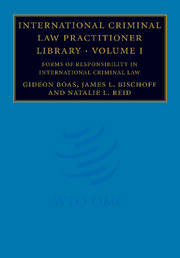Book contents
- Frontmatter
- Contents
- Foreword
- Table of authorities
- 1 Introduction
- 2 Joint criminal enterprise
- 3 Superior responsibility
- 4 Complicity and aiding and abetting
- 5 Planning, instigating and ordering
- 6 Concurrent convictions and sentencing
- 7 Conclusion
- Annex: Elements of forms of responsibility in international criminal law
- Index
Foreword
Published online by Cambridge University Press: 08 January 2010
- Frontmatter
- Contents
- Foreword
- Table of authorities
- 1 Introduction
- 2 Joint criminal enterprise
- 3 Superior responsibility
- 4 Complicity and aiding and abetting
- 5 Planning, instigating and ordering
- 6 Concurrent convictions and sentencing
- 7 Conclusion
- Annex: Elements of forms of responsibility in international criminal law
- Index
Summary
International criminal law is a new branch of law, with one foot in international law and the other in criminal law. Until the Nuremberg trial, international criminal law was largely ‘horizontal’ in its operation – that is, it consisted mainly of co-operation between states in the suppression of national crime. Extradition was therefore the central feature of international criminal law. Of course there were international crimes, crimes that threatened the international order, such as piracy and slave trading, but with no international court to prosecute such crimes, they inevitably played an insignificant part in international criminal law. In 1937 came the first attempt to create an international criminal court, for terrorism, but the treaty adopted for this purpose never came into force. The Nuremberg and Tokyo trials mark the commencement of modern international criminal law – that is, the prosecution of individuals for crimes against the international order before international courts. The Nuremberg and Tokyo tribunals have been criticised for providing victors' justice, but they did succeed in developing a jurisprudence for the prosecution of international crimes that courts still invoke today. The Cold War brought this development to an end. Attempts to create a permanent international criminal court failed and it was left to academics to debate and dream about the creation of such a court for the next forty years.
All this changed with the end of the Cold War and the creation of ad hoc tribunals for the former Yugoslavia and Rwanda.
- Type
- Chapter
- Information
- International Criminal Law Practitioner Library , pp. xiii - xviPublisher: Cambridge University PressPrint publication year: 2008
- 1
- Cited by



